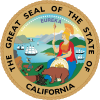Safe and Secure Innovation for Frontier Artificial Intelligence Models Act
| Safe and Secure Innovation for Frontier Artificial Intelligence Models Act | |
|---|---|
 | |
| California State Legislature | |
| Full name | Safe and Secure Innovation for Frontier Artificial Intelligence Models Act |
| Introduced | February 7, 2024 |
| Senate voted | May 21, 2024 (32-1) |
| Sponsor(s) | Scott Wiener |
| Governor | Gavin Newsom |
| Bill | SB 1047 |
| Website | Bill Text |
The Safe and Secure Innovation for Frontier Artificial Intelligence Models Act, or SB 1047, is a 2024 California bill with the policy goal of reducing the potential risks posed by highly advanced, general-purpose foundation artificial intelligence models, also known as frontier AI models. The bill would also establish CalCompute, a public cloud computing cluster for startups, researchers and community groups.
Background
The bill was motivated by the rapid increase in capabilities of AI systems in the 2020s, including the release of ChatGPT in November 2022.
In May 2023, AI pioneer and Turing Award recipient Geoffrey Hinton resigned from Google, warning that humankind could be overtaken by AI as soon as the next 5 to 20 years.[1][2] Later that same month, the Center for AI Safety released a statement signed by Hinton and other AI researchers and leaders: "Mitigating the risk of extinction from AI should be a global priority alongside other societal-scale risks such as pandemics and nuclear war."
Governor Newsom and President Biden issued executive orders on artificial intelligence in late 2023.[3][4]
Provisions
SB 1047 initially covers AI models with training compute over 1026 integer or floating-point operations. This is the same compute threshold as the Executive Order on the Safe, Secure, and Trustworthy Development and Use of Artificial Intelligence. The European Union's AI Act set its threshold one order of magnitude lower at 1025.
In addition to this compute threshold, SB 1047 has a cost threshold of $100 million. The intention is to exempt startups and small companies, while covering large companies that spend over $100 million per training run.
Reception
Senator Wiener introduced the bill in February 2024, with the Center For AI Safety Action Fund, Encode Justice and Economic Security California as sponsors, and with Geoffrey Hinton and Yoshua Bengio as supporters.[5]
The bill is opposed by industry trade associations including the California Chamber of Commerce, TechNet and the Chamber of Progress. Companies Meta and Google argue that the bill would undermine innovation and the technology industry.[6]
Public opinion
A David Binder Research poll commissioned by the Center for AI Safety Action Fund found that in May 2024, 77% of Californians support a proposal to require companies to test AI models for safety risks before releasing them.[7] A poll by the AI Policy Institute found 77% of Californians think the government should mandate safety testing for powerful AI models.[8]
See also
References
- ^ Metz, Cade (2023-05-01). "'The Godfather of A.I.' Leaves Google and Warns of Danger Ahead". The New York Times.
- ^ Lazarus, Ben (2023-05-06). "The godfather of AI: why I left Google". The Spectator.
- ^ "Governor Newsom Signs Executive Order to Prepare California for the Progress of Artificial Intelligence". Governor Gavin Newsom. 2023-09-06.
- ^ "President Biden Issues Executive Order on Safe, Secure, and Trustworthy Artificial Intelligence". White House. 2023-10-30.
- ^ "Senator Wiener Introduces Legislation to Ensure Safe Development of Large-Scale Artificial Intelligence Systems and Support AI Innovation in California". Senator Scott Wiener. 2024-02-08.
- ^ Korte, Lara (2024-06-26). "Big Tech and the little guy". Politico.
- ^ "California Likely Voter Survey: Public Opinion Research Summary". David Binder Research.
- ^ "AIPI Survey". AI Policy Institute.
